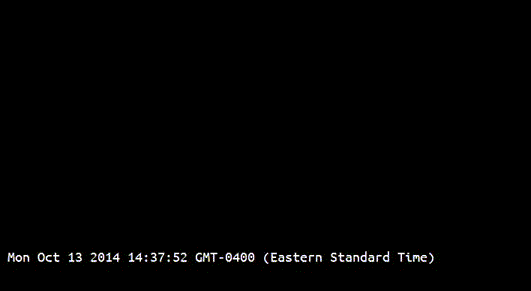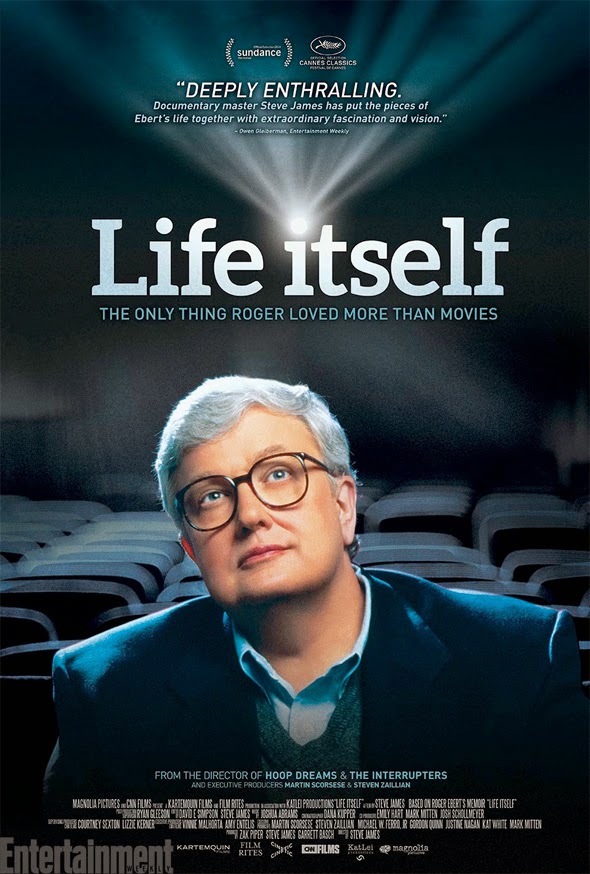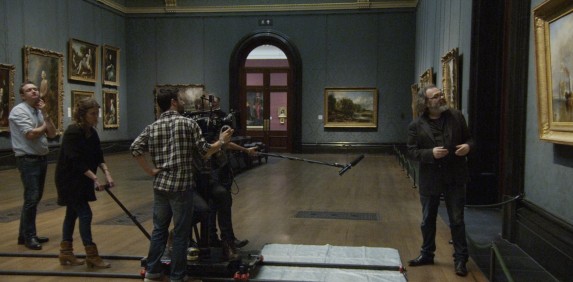In Conversation: Oscar's Documentary Class of 2014 (Part 2)
 Tuesday, February 3, 2015 at 2:00PM
Tuesday, February 3, 2015 at 2:00PM Welcome back to The Film Experience's look at this year's Oscar documentary nominees. Glenn Dunks is again joined by Daniel Walber of Nonfics in this second part looking at the once maligned and controversy-filled Best Documentary Feature category. If you missed part one then go read that first - our thoughts on Wim Wenders' The Salt of the Earth were not echoed by you, the readers, but that's what makes this all so fun. If you're a fan, check out discussion from last year about the 1989 winner, Common Threads.

Daniel: (cont'd) The way [Virunga director Orlando von Einsiedel] orchestrates it all, particularly in the thrilling climax, is what sets it apart. In a way that makes it not unlike Last Days in Vietnam (Glenn's review). Both films take a single sequence of events, in that case the 1975 evacuation of Saigon, and tell its story with several different perspectives. I’m not sure the strategy works quite as well for Last Days in Vietnam, which is also the only nominee this year made up primarily of archival footage. Do you think that has something to do with it?
Archival power, Roger Ebert and our own ballots after the jump
Glenn: Last Days in Vietnam may be a film made primarily out of archival footage, but what archival footage! I remember seeing this in Sundance and being swept up in the story as it gets told from its multiple viewpoints (soldiers on the ground, nationals desperate to escape, the officials trying to get people out). It made me realize that for as common as Vietnam is as a subject of both narrative and documentary cinema, rarely has this particular part of the war been told so palpably. I had been predicting it as an Oscar nominee from the moment the end credits rolled. I sense I liked it a lot more than you.
Sure, Rory Kennedy’s film is the most traditional of the five nominees and it certainly doesn’t want for potentially exacerbating talking heads, but I enjoyed the detail with which it zoomed in on moments from the fall of Saigon both famous and otherwise. And with those who were directly involved in the events, too. I admired how it dynamically sought to present itself as a definitive document of sorts and I certainly think there’s a place for documentaries like that in a landscape that puts increasing importance on bold-faced, modern cinematic language whether it’s appropriate for the material or not.
Which actually leads very nicely into Laura Poitras’ Citizenfour (For Your Consideration / TFE podcast), which feels like a very comfortable blend of old-school observatory doc with flashy, new wave modernity. Is that a fair assessment?

Daniel: Sure, though I think that it’s flashier on paper than it is in practice. The excitement comes from those of us in the audience, bringing along our own sense of history. The footage of Poitras, Glenn Greenwald and Edward Snowden is a tremendously important document, and we all know that going in. Yet as a film, it’s less interested in the excitement of the leak than it is in the more prosaic details of paranoia – a conversation Greenwald and Snowden have about password protection, for example.
Poitras’s triumph comes from her total lack of contentment in simply laying out the story of Snowden’s whistleblowing and summarizing the information he brought to the world. The film is a portrait of a number of activists and journalists, all of whom have been profoundly affected by a life lived with the knowledge of government surveillance. It almost becomes a superhero movie, or at least a philosophically-minded portrait of lives apart. It’s immensely personal, including intimate moments of Snowden, Greenwald and Poitras herself, but it’s also very broadly symbolic. Its images of empty Utah, where the NSA is constructing its giant new data center, are unforgettable signs of a horrific potential 21st century.
It’s also the only film that has been a certainty in this category for months, and it’ll probably win. What do you think?
Glenn: Oh I agree entirely. Citizenfour is excellent and, much like Finding Vivian Maier, works most because of the way it unfolds organically for both filmmaker and viewer, as well as the unique insight it allows into the individuals themselves and the material they put out into the world (creative or departmental). It plays as a look into somebody's world that we otherwise would never be allowed and that extends into the wider discussion about why documentaries are so exciting at the moment. We are being given so much access to so many walks of life that it's truly mind-boggling. If Cititzenfour is to win, and I think that's a fair assumption, it'd be a very smart choice - it's hard to see Citizenfour not being the definitive documentary for the year.
 It's funny that you mention its inevitability as a nominee given the other doc that was widely expected was the Roger Ebert documentary Life Itself. I was no fan of the film as I have said on multiple occasions and I felt somewhat bad rooting against it so much when its intentions were so good. I just don't think it was particularly well-made. It's curious that the doc branch chose two films about photography and then, as they've done in recent years with Stories We Tell, left off the two documentaries about filmmaking (Jodorowsky's Dune being the other shortlisted title). Not sure what that says, but I think it's interesting.
It's funny that you mention its inevitability as a nominee given the other doc that was widely expected was the Roger Ebert documentary Life Itself. I was no fan of the film as I have said on multiple occasions and I felt somewhat bad rooting against it so much when its intentions were so good. I just don't think it was particularly well-made. It's curious that the doc branch chose two films about photography and then, as they've done in recent years with Stories We Tell, left off the two documentaries about filmmaking (Jodorowsky's Dune being the other shortlisted title). Not sure what that says, but I think it's interesting.
Daniel: I still haven’t seen Life Itself, so I’m not all that qualified to talk about its chances, but I do think the awkwardness of Steve James’s history with the Academy has more to do with film critic hype than anything else. He’s a great director, one of the best, but so are Frederick Wiseman, Werner Herzog, Ken Burns and the Maysles brothers. Each of these filmmakers has been nominated just once in their entire careers, James included (admittedly for Best Editing). Yet it seems that every time James makes a movie, film critics get really excited and decide that it’s a frontrunner. This stuff is always trickier than it seems.
My personal ballot would be:
Citizenfour
The Overnighters
The Last of the Unjust
National Gallery
What Now? Remind Me
Glenn: That's an incredibly solid list. When it came to thinking of mine I cheated and included a couple of titles that weren't even released in America. They were so good, I couldn't help myself and it's highly unlikely they will ever actually be released here so maybe the recommendation can help readers seek them out.
My personal ballot:
Aim High in Creation
Citizenfour
Last Days in Vietnam
My Prairie Home
National Gallery


We hope you enjoyed this critical look inside the documentary category for 2014. We're proud of our doc coverage here at The Film Experience so let us know more about your favorite titles of the year and any agreements or grievances you had. It's good seeing people get passionate about non-fiction so we'd love to hear from you in the comments.



Reader Comments (13)
The Last of the Unjust is 220 minutes long? Damn.
I still have plenty to see but so far, my ballot:
20,000 Days on Earth
Finding Vivian Maier
Jodorowsky's Dune
Maidentrip
Night Will Fall
Since documentaries never get released anywhere near my home (if Citizenfour wins, it will hopefully get a week), these series are my only chance to really hear about these films so I appreciate your efforts here. Thank you.
The one i most regret missing (particularly since i didnt get a screener) is Jodorowsky's Dune. But i am so far behind on watching these. I feel the guilt
Just an FYI: The Overnighters comes out to stream on Amazon today. I have not verified yet but I believe it may also be out on Netflix Instant. I saw in a press release that it was also coming to Netflix this month so I assume that was today as well.
Re: Last Days of Vietnam, I'm agree that the found footage is astounding. The scene with folks trying to board the airplane as it's taking off made me extremely emotional. What an amazing intro to the desperation of that period.
The LIFE ITSELF snub still stings. I already accept Hollywood as it is and always was a patriarchal white supremacy. Of course Selma and anything else black had very little to show for or nothing at all. But I guess critics make the industry insecure. Does not matter that Ebert was one of the good guys. Nope.
/3rtful -- you seriously can't blame everything on that. it's tiresome. Guess what: Roger Ebert was a white old man of considerable privilege. The truth is documentary is the #1 Oscar category wherein something super acclaimed that many people think is a shoo-in will always gets shut out. Happens every year.
and for whatever reason, this branch isn't super into movies about movies.
Great conversation guys, thanks,
A film I wish had gotten into the mix this year was "Regarding Susan Sontag." I know the Academy rarely nominates docs that are single-subject portraits (Joan Rivers, Elaine Stritch, Roger Ebert), so I didn't expect them to go for this one, about celebrated author Susan Sontag. (A critic's misguided pan in the NY Times didn't help either.)
It's a beautifully put together film with a great score and visual collages that illustrate Sontag's writing. It's also a deep exploration of her publicly closeted but privately exuberant lesbian sexuality. It's the first time anyone's been able to address this fully, since Sontag, who was so forthcoming about her politics and philosophy and views on culture, kept this door largely shut while she lived. Definitely check it out (available on HBO).
Great dialogue, guys - you inspired me to finally get off my ass and seek out more of the nominees (prior to this weekend i'd only seen Citizenfour), so thanks!
I saw Virunga and Finding Vivian Maier. Virunga is my favorite of the three so far - it's beautifully filmed, suspenseful, intensely moving (the devotion of the park rangers in the face of constant danger really got me) and very informative. It maybe tries to cover too much ground, but that's not a huge complaint.
With Finding Vivian Maier, I really loved the first half, but as the film went along I found myself feeling uncomfortable with the degree to the which the filmmakers seemed intent on exposing Vivian's "dark side."
Citizenfour's main value is in showing a huge international story/scandal unfolding in near real time, from inside Snowden's hotel room. That's a Joe Biden-esque big fucking deal, even if I still have reservations about Poitras, Greenwald, Snowden, and, well, pretty much everything the film is about.
And I'm with Glenn on Life Itself. I get why people who love Ebert revere the film, but I don't think the actual film rates well at all.
Nathaniel R --
Hollywood is a patriarchal white supremacy. I will say it over and over. Like you continuously do with the activist queer lingo you love so much---heteronormative and gender nonconforming.
There are tons of white guys I appreciate in the movie business. Because it is their fucking business. They own it and run it how they see fit. Patriarchal white supremacy.
I hope Citizen Four loses.
Nathaniel: "Jodorowsky's Dune" is available now on disc/digital and is well worth checking out.
I've seen all the nominees but "The Salt of the Earth" and almost all of the short-listed docs. I'm glad "The Case Against 8," which ignored decades of gay activism, wasn't nominated, but I wish room had been found for "Life Itself," which I found marvelous, and "Keep On Keepin' On," which was something special. I would have dropped "Finding Vivian Maier," which I found engrossing but troubling, and, I suppose, "Salt of the Earth," because I'm mad that the publicist hasn't gotten me a screener (I kid, I kid).
/3rtful, I can understand that, but how on Earth does it pertain to Life Itself? It was an extremely well-reviewed doc about a famous Hollywood insider by an acclaimed white filmmaker? Do you think it's because he's married to an African American woman? As I said in the piece and as Nat said in the comment, docs about film rarely do well in this category (for whatever reason - perhaps they're very aware of how potentially inside baseball that could look?) and while I didn't care for all of the nominees, it's certainly a solid bunch of nominees without Life Itself.
San FranCinema, I wasn't much of a fan of the Sontag doc. I saw it nearly a year ago so my mind is fuzzy on it, but I remember being somewhat disappointed that such a woman was given such a rote documentary about her life. We obviously differ on that point.
SadMan, 20,000 Days was so good, wasn't it?
Chip C, i also was not a fan of The Case Against 8. Highlighted the very conservative nature of the gay rights movement without actually engaging in or discussing it. It was content to just be nice and make viewers feel happy (and the affluent people can smile about their wealth as well).
Glenn --
People have trouble following my posts. And will selectively respond to the point they think I'm making. I never inferred that racism is the cause for Life Itself missing a nomination. I mentioned my acceptance of Hollywood's identity as a white supremacist patriarchy and coupled it with critics making the industry feel insecure. Ebert being a wonderful human being and writer meant nothing to them because his contribution to the medium was criticism.
Jodorowksy's DUNE is my favorite of the docs I've seen from 2014. Much more than "just" the story of one film that wasnt' made. It's a very well told of the artistic process, the dream of art and the collision with commerce. It also acts a very nice tribute to Jodorowksy's work in total, and he makes a damn fine centerpiece himself.
I also recommend DANCE OF REALITY which Jodorowsky DID get made, and was released last year as well.